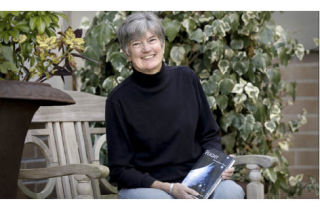Linda Bierds’ drive to write poetry is matched by her practicality as a teacher and a published author. She understands all too well that poetry is a tough sell.
“Taken as a whole, most people would rather read…anything but poetry. It’s a shared aversion,” she said.
It’s a relief for a lazy, guilty reader to be let off the hook. Because poetry (the erstwhile English major whined) can be hard. It’s a short form but a demanding one, and the amount of care and concentration required for a rewarding reading of a good poem parallels the amount of same required to write the poem in the first place.
Here’s where Bierds’ skill and patience as an instructor kick in. Yes, she acknowledged, there’s an ever-present tension between a poet’s irrepressible push to compose, and the likelihood that he or she will find a limited audience among the general population of readers.
And yes, poetry can be hard – especially her brand, which is not confessional or autobiographical, but a blend of resonant language, sometimes mysterious imagery and a soaring expanse of historic, scientific, medical and literary references. Her latest collection of new and selected works, “Flight,” spans nearly a quarter century of such work.
Good poetry, Bierds said, captures its reader on a number of levels. The first is aural; words that appeal to our most primal sense of sound can create a powerful hook.
A poem should also, to put it simplistically, be “about” something.
“It needs to have a mission,” she said. “That mission may be to illuminate a subject, or to entertain by the musical quality of language, or to be persuasive about a particular idea or ideology.”
The title poem, a new one, offers an intriguing example.
“Osseous, aqueous, cardiac, hepatic,” reads the first line of “Flight.”
Pressing onward, the reader is taken through a lyrical meditation on an astronaut who has returned from years in space with atrophied limbs, heart, and lungs.
As a doctor examines him, the opening words mimicking the sounds elicited through his stethoscope and percussion hammer, the patient imagines himself back in space, looking down at the scene and at the Earth as a distant whole, as he contemplates his childhood and his place in the universe.
Bierds said the idea for the poem came about when she read of a phenomenon whereby astronauts return from space literally smaller, with body mass and internal organs shrinking in increasing amounts as time went by in the great beyond.
“That was a fact that just overwhelmed me – that the longer we move toward a different world, then the less there is,” she said.
“Flight,” as both a closing poem and as the title piece, encapsulates the evolution of Bierds’ work.
“I think the biggest difference across the 25 years of work is that the work began with wonder – I was a poet full of wonder,” she said.
“But what’s happened is I’m now much more driven by what is happening to the world’s physical systems. So wonder has been replaced by a form of fear – ‘trepidation’ would be the word.”
Pretty worthwhile concepts to explore. But Bierds stressed that even if her particular brand of expression isn’t a reader’s cup of tea, the world of contemporary poetry offers a variety of accessible, remarkable formats, be they poetry slams, Hip-Hop lyricism, or former Poet Laureate Billy Collins.
“All these wonderful things that say, ‘Don’t be afraid of language.’ You can just come, and nobody will deter you,” she said.



